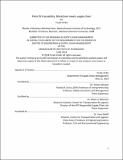Palm oil traceability : blockchain meets supply chain
Author(s)
Hirbli, Toufic
DownloadFull printable version (1.907Mb)
Other Contributors
Massachusetts Institute of Technology. Supply Chain Management Program.
Advisor
Simon Johnson and Alexis H. Bateman.
Terms of use
Metadata
Show full item recordAbstract
There is a current lack of visibility in the transfer of goods from farmers to oil mills, to manufacturers, to retail outlets and finally to the consumer in the palm oil industry. While leading brands have pledged to commit to a 100% sustainable certification, only 19% of global palm oil production is certified as sustainable. Emerging technologies, such as blockchain, a distributed ledger, can transform supply chain traceability as we know it and bring more transparency through the value chain, creating value to stakeholders. From a process perspective, the proposed solution leverages the mass balance, and book and claim traceability models that RSPO has defined. From a technology perspective, the proposed solution leverages blockchain, geospatial imagery classification, and IoT technologies to keep track of the flow of physical goods and sustainable palm oil certificates. From a people perspective, the proposed solution includes a set of incentive models that could be utilized in easing change management efforts.
Description
Thesis: M. Eng. in Supply Chain Management, Massachusetts Institute of Technology, Supply Chain Management Program, 2018. This electronic version was submitted by the student author. The certified thesis is available in the Institute Archives and Special Collections. Cataloged student-submitted from PDF version of thesis. Includes bibliographical references (pages 36-38).
Date issued
2018Department
Massachusetts Institute of Technology. Supply Chain Management ProgramPublisher
Massachusetts Institute of Technology
Keywords
Supply Chain Management Program.